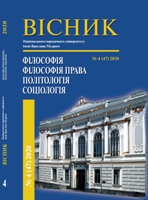PRIVATIZED VIOLENCE: THE ESSENCE AND TYPES OF ITS IMPLEMENTATION IN MODERN WORLD
PRIVATIZED VIOLENCE: THE ESSENCE AND TYPES OF ITS IMPLEMENTATION IN MODERN WORLD
Author(s): Mykola Adamovich Kozlovets, Vadym Mykolayovych SlyusarSubject(s): Security and defense, Studies in violence and power, Peace and Conflict Studies
Published by: Національний юридичний університет імені Ярослава Мудрого
Keywords: violence; non-violence; phenomenology of violence; social violence; privatized violence; fairer violence; society; social order;
Summary/Abstract: The social nature of violence and its forms, peculiarities of manifestation and realization are considered in the article. The concept of «privatized violence» was conceptualized in the context of theoretical and general cultural studies of violence, which made it possible to distinguish it from the general conceptual term «social violence» and to define it as an objective factor of social development, as well as to organize it on various grounds. The reasons for the occurrence of privatized violence and the factors that cause it to intensify in the current context. On the basis of the historical experience analysis and modern practice, the content and specifics of the privatized violence manifestation, mechanisms and factors of its implementation in the modern world are investigated. Particular attention is paid to the impact of globalization processes on violence, the establishment and strengthening of its indirect, privatized forms. The manifestations of violence and aggression state the importance of biological and psychological qualities, but the determining factor is the social factor. The peculiarity of different approaches to the problem of privatized violence is the search for tools, a certain theoretical model that will exclude or regulate the manifestations of this social phenomenon at all levels of human practices. Analysis of the anthropological determinants of human aggressiveness shows that centuries of socio-genesis, a person's internal ability to contain his tendency to violence and aggression, is easily overcome by the influence of external factors, such as ideology. In addition, the sphere of human corporeality is now increasingly regulated through medicine, psychology, genetics, educational and manipulative technologies. If political violence is institutionalized, incorporated into the mechanism of action of society's values, embedded in the social structure by various methods, and transformed into an instrument of social order organization, primarily through coercion, stimulation and persuasion, then hidden violence, on the contrary, stimulates the increase of uncertainty and chaotic life of everyday life.The anthropological component of privatized violence turns it into a phenomenon of social consciousness, which is an essential factor determining the process of cultural and historical society development. The function of punishment exercised by the subjects of privatized violence to establish «social justice» is the modern equivalent of the institute of vengeance, which is based on a specific irrational understanding of people's perceptions of damages through revenge. The peculiarities of the political culture of transformational Ukrainian society are revealed, which influence the intensification of socio-political tensions and motivation for privatized forms of violence. Social groups that resort to privatized violence and models of communicative behavior and management styles in conflict and post-conflict situations are considered. The conclusion is made about the social conditionality of privatized violence and the feasibility of forming a culture of nonviolence, tolerance and consent in the current context.
Journal: Вісник НЮУ імені Ярослава Мудрого. Серія: Філософія, філософія права, політологія, соціологія
- Issue Year: 47/2020
- Issue No: 4
- Page Range: 94-111
- Page Count: 18
- Language: English

